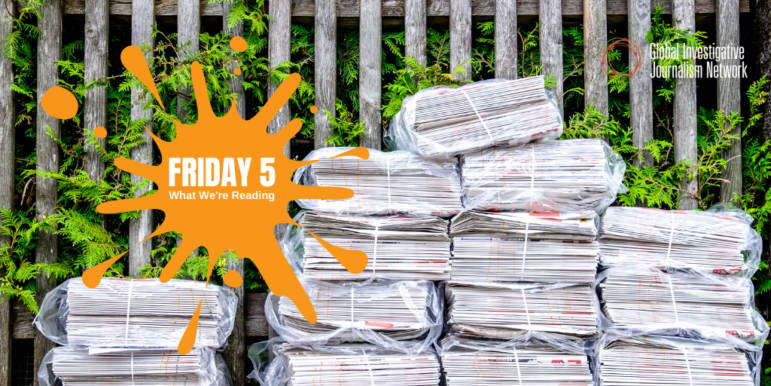
Image: Pexels
This week’s Friday 5, where we round up our favorite reads from around the online world in English, includes Meduza’s report on Russian editor Roman Badanin’s Pulitzer-charged rant against The New York Times, ProPublica’s sober response to the “Plandemic” viral video, and Poynter’s advice about an ethics policy that includes guidelines for pre-publication source review.
“Fuck the Pulitzer — I Just Want a Hyperlink” (Meduza)
Any local journalist who has had their work cherry-picked and featured in some way, without credit, by big circulation English-language outlets, raise your hands. 🙌 It’s what Alexey Kovalev wrote about this week in exiled Russian news site Meduza, referencing a Facebook post by Roman Badanin, editor-in-chief of Proekt, another gutsy Russian news outlet. Badanin blasted The New York Times for not acknowledging Proekt’s reporting in its story on Vladimir Putin’s regime that had just won a Pulitzer Prize. The Times defended reporter Michael Schwirtz, who also responded on Twitter. New York University’s Jay Rosen also took the paper to task a while back for not crediting the work of South African journalists in #GuptaLeaks, which won a Shining Light Award at #GIJC19 last year.
I’m an Investigative Journalist. These Are the Questions I Asked About the Viral “Plandemic” Video (ProPublica)
Social media feeds lit up last week with a viral story — and I know I’m not the only journalist who had friends message asking about the claims made in “Plandemic.” That’s because I also read investigative health care reporter Marshall Allen’s excellent response to the video, which claimed the coronavirus is part of a “hidden agenda.” (Hint: An eyeroll emoji is not the correct answer.) ProPublica’s Allen described how his brother sent a text to ask if Allen could write something up that would “help people distinguish between sound reporting and conspiracy thinking or propaganda.” Allen notes that his checklist can help “interrogate any content — and that includes what we publish at ProPublica.” Not everyone knows how journalists work, so helping news consumers to better understand what quality journalism is and how its done is an important service that compliments the important fact-checking which responded to the video. Read more on the methods journalists used to dismantle the “Plandemic” video.
Should Journalists Let Sources Look Over Stories Before Publication? (Poynter)
For some media professionals, Poynter asked a jarring question this week: Should journalists let sources look over stories before publication? But what was once considered far outside the parameters of respected US journalism practice has moved into more murky waters — and is accepted practice in some countries, as BuzzFeed News notes in its ethics policy. No matter. Columbia’s Thomas Kent makes an excellent point for reporters around the world. Whatever your policy is — reading back quotes for accuracy or sending a note prior to publication that “includes allegations or a description of what will be published” — make sure all reporters know it. For publications who haven’t already set stringent parameters on the issue, Kent outlines important questions for newsrooms — along with reporters — to consider.
Like It or Not, Google and Facebook Are Becoming the Leading Patrons of the News Industry (Digiday)
Since the pandemic hit, news websites have seen soaring traffic while traditional advertising has taken a massive plunge, leading to layoffs and shutdowns across an already ailing industry. But just how Big Tech’s involvement in news organizations will shake out is still guesswork. According to Digiday, over the next few months Google and Facebook will “spend close to a quarter billion dollars supporting local news” through “emergency relief grants, extra marketing dollars earmarked for ads on publishers’ sites, and the waiving of fees Google normally collects from its ad server.” While last week’s Friday 5 noted how the world is watching as Australia takes on Google and Facebook over news content, this week the NYT’s Ben Smith (founding editor of BuzzFeed news) wrote more about Big Tech involvement in news in his column. Meanwhile, journalists — including ex-Guardian chief editor Alan Rusbridger — joined politicians and judges to sit on Facebook’s free speech panel.
Crackdown on Journalists Covering COVID-19 (RFE/RL)
The pandemic-inspired crackdown on media isn’t going away anytime soon. As this graphic in Radio Free Europe/Radio Liberty shows, since the first move by China in February, which started an international dispute over the government expelling two US reporters, it has only spread — something groups like Amnesty, Human Rights Watch, Reporters Without Borders and the Committee to Protect Journalists have all been following. This round-up from the International Consortium of Investigative Journalists shows that no country is immune, though some regions could be in more danger than others; recent stories from journalists in the Middle East and North Africa illustrate how authorities there are leveraging the COVID-19 pandemic to silence critical voices.
 Tanya Pampalone is GIJN’s managing editor. Prior to GIJN, she was executive editor of Mail & Guardian, managing editor of Maverick (now Daily Maverick), and head of strategic partnerships and audience development for the African arm of The Conversation. Tanya is also co-editor of I Want To Go Home Forever, and a contributor to Southern African Muckraking and Unbias the News.
Tanya Pampalone is GIJN’s managing editor. Prior to GIJN, she was executive editor of Mail & Guardian, managing editor of Maverick (now Daily Maverick), and head of strategic partnerships and audience development for the African arm of The Conversation. Tanya is also co-editor of I Want To Go Home Forever, and a contributor to Southern African Muckraking and Unbias the News.
